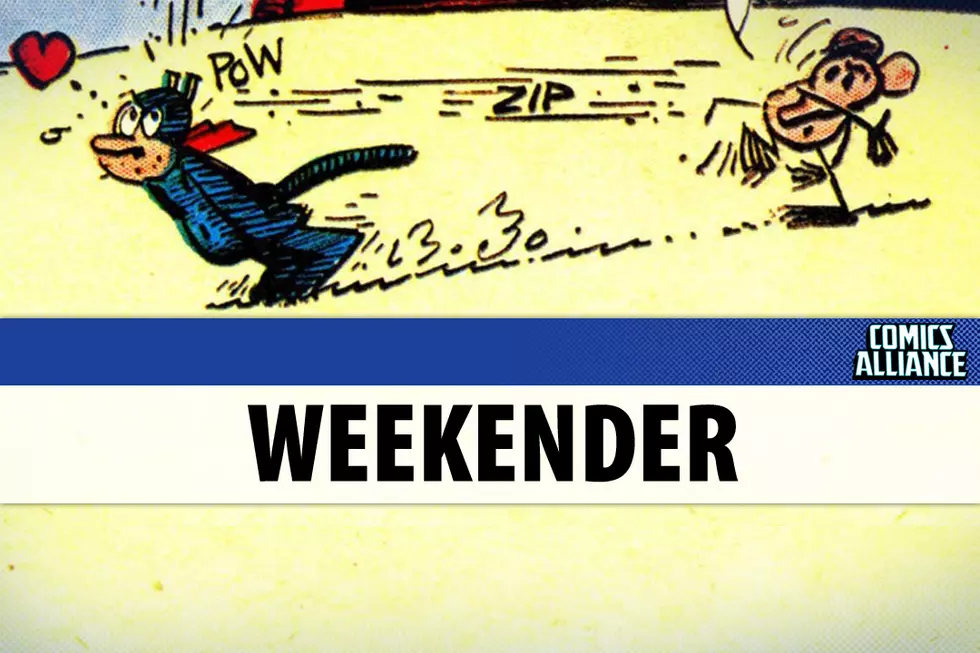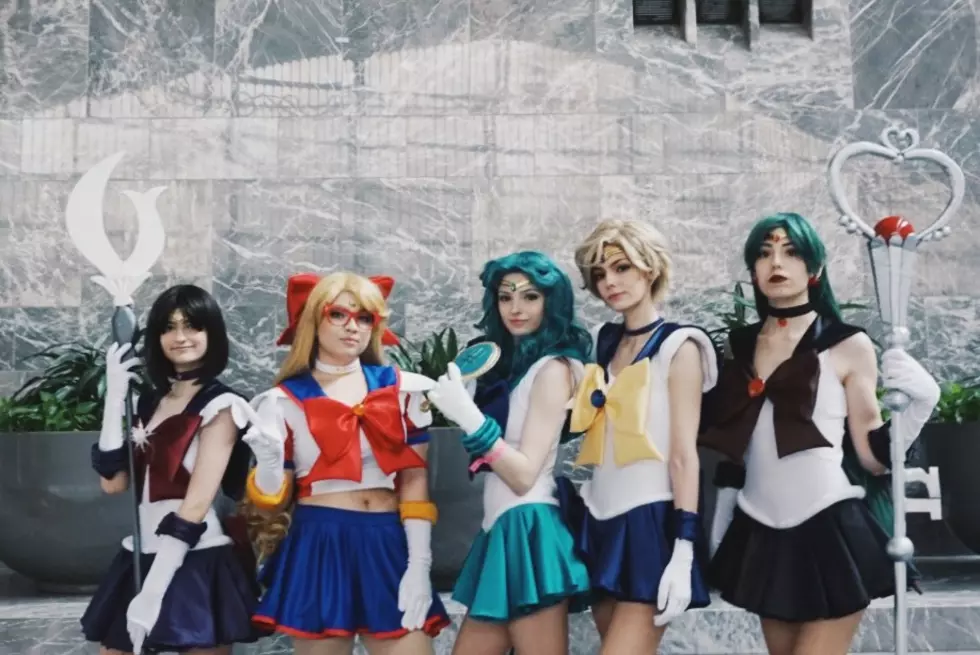
Gareb Shamus Admits Wizard Cons Not Really About Comics Anymore
 Wizard World Chicago took place over the weekend -- or as it is now called, "Wizard World Chicago Comic Con." Wizard founder Gareb Shamus recently affixed "Comic Con" to the names of Wizard's shows, presumably to cash in on the name and visibility of larger, more popular events like the massive San Diego Comic-Con and New York Comic-Con. It's a business move, but a distasteful one, mostly because this rebranding took place at a time when Wizard World shows have less to do with comics than ever.
Wizard World Chicago took place over the weekend -- or as it is now called, "Wizard World Chicago Comic Con." Wizard founder Gareb Shamus recently affixed "Comic Con" to the names of Wizard's shows, presumably to cash in on the name and visibility of larger, more popular events like the massive San Diego Comic-Con and New York Comic-Con. It's a business move, but a distasteful one, mostly because this rebranding took place at a time when Wizard World shows have less to do with comics than ever.
It is somehow fitting that he biggest news coming out of the convention is that impeached former Illinois governor Rod Blagojevich showed up to gladhand the crowds and trade the remaining minutes of fame/notoriety from his indictment on federal corruption charges for $50 photo ops and $80 autographs. He even signed one photo "You are f**king golden," a shoutout to his wiretapped comment about allegedly trying to sell the Senate seat of Barack Obama for bribes.
Matthew J. Brady had a chance to talk with Shamus over the weekend in Chicago, and asked him some questions about the recent changes at Wizard World Chicago (Comic Con), notably the shift in focus away from actual comics and towards generalized pop culture, i.e. B- and C-list celebrities from defunct television shows.
Much can be summed up by Brady's note that "Mr. Shamus doesn't seem to think of comics as a separate medium, but rather one of many conduits through which people can experience and interact with corporate-owned properties." And Shamus has never seemed more out of touch than when he describes Blagojevich with unctuous positivity:
"When you look at what's going on in today's world, there's one thing that people have been talking about like crazy over the last few days [note: Blagojevich's federal trial ended on August 17, two days before the convention began, with one conviction and a mistrial on the remaining 23 counts], and it's Rod. And he was the former governor of Illinois. And when you look at him as a personality in pop culture today, he was on the Today Show; 60 Minutes wants him; 20/20 wants him; [...] a hundred news outlets [...] want him. But we got him! He chose us because we created a very compelling opportunity for him to see people. He was a very popular governor; people actually liked him here."
Blagojevich, of course, is famous for pulling down some of the lowest approval ratings in history, dipping as low as 7% at one point, and earning the title of "least popular governor in the country." According to Brady, when his name was announced over the loudspeaker in Chicago, the floor was deafened with boos. It's telling both that Shamus reacts to Blagojevich's attendance at his convention with the same strange, insecure pride of a kid grateful not to be picked last for gym class, and that he so badly confuses notoriety for respect, flash for substance, and the roar of the Roman Colosseum for love.
In many ways this doesn't sound terribly different from particular corners of San Diego Comic-Con, but it's important to remember that SDCC also has Marvel, DC, and virtually every other comics company in attendance making major announcements, and many of the biggest TV and film panels and announcements are related to comics properties as well. San Diego may have ballooned wildly to include all manner of other media, but the core comics presence there is still significant, solid, and defining.
Asked about the broadening focus of Wizard World Chicago, Shamus pointed to a greater interest in the gateways that draw people to comics than comics themselves:
"When you look at how comic books or the characters pervaded the media, they've become celebrities themselves. They've become movie stars; they've become television stars; they've become video game stars or toy stars. So when you look at people, and how they've come to know Spider-Man, or Batman, or Star Wars, ten years ago, fifteen years ago, twenty years ago, they may have only known Spider-Man through a comic book or maybe an animated show or something like that. But today, hundreds of millions of people know Spider-Man through the movies, not by reading a comic book. So what we've been able to do is create a really amazing pop culture focus to the show, so that no matter how you enjoy these characters, this is a place to come together to find them."
Which is to say that he cares about comic book characters, but only to the extent that they are represented in more popular media. Also, while Marvel Comics and DC Comics -- the publishers of Spider-Man and Batman -- have attended Wizard World Chicago in years past, the Big Two were nowhere to be found this time around. Also absent were virtually all of the next-tier publishers, including Dark Horse Comics, Image Comics, IDW, Oni Press, Dynamite Entertainment and Boom! Studios. And there was almost no comics-focused programming to be found at the convention, save three Q&As with Greg Horn, Victor Gischler, and Joe Madureira and a Tokyopop panel.
"People have this impression that everybody wants to go to every panel, and the reality is that we just want to do panels that people want to go to," said Shamus. "We're not doing them for the sake of doing them, or to have two hundred of them, and anybody can go hear anybody talk about anything. At the end of the day, we want to do things that matter."
Apparently, not comics.
Of course, it's easy to get a bit chicken and egg here; Shamus can say there isn't more comics content because there aren't enough comics fans seeking it out, but it's just as easy to say that you aren't going get those fans in attendance if you don't make any sort of active effort to give them the sort of content they'd want.
Similarly, when Brady asks about the possibility of a bigger push to attract more comics publishers and creators, Shamus essentially says they can totally come if they want, but shows no interest in making any effort to encourage more representation of the industry aside from letting them walk through the door if they want to. Which, for what it's worth, is the same thing the convention offers the Suicide Girls and former "Beverly Hills 90210" star Ian Ziering.
It hard to to believe that any convention that purports to value comics in any real way could think that "Comics: We Don't Lock Them Out of the Convention Center" is a responsible or encouraging marketing strategy, but there you have it. And really, it's hard to think of a better way to tacitly discourage comics people from coming to a "comics" convention than generalized apathy and indifference towards their presence.
As Heidi MacDonald discusses at The Beat, Shamus certainly has no obligation to make comics the focus of his convention -- or prevent their presence from disintegrating -- but at the very least, the decision to specifically brand it as a Comic-Con as it downshifts away from the medium and towards pop culture mediocrity is disingenuous at best.
Brady has the last word on the subject, and one that I think may be echoed by many comics fans:
Speaking for myself, I think this is the year that Wizard World and I part ways. The spirit of comics is a fading memory, and judging by shark-jumping trends like the Blagojevich appearance, the emphasis on other elements of pop culture besides comics will only increase in the future. So long, Wizard World. It was kind of fun while it lasted.
More From ComicsAlliance










 "When you look at how comic books or the characters pervaded the media, they've become celebrities themselves. They've become movie stars; they've become television stars; they've become video game stars or toy stars. So when you look at people, and how they've come to know Spider-Man, or Batman, or Star Wars, ten years ago, fifteen years ago, twenty years ago, they may have only known Spider-Man through a comic book or maybe an animated show or something like that. But today, hundreds of millions of people know Spider-Man through the movies, not by reading a comic book. So what we've been able to do is create a really amazing pop culture focus to the show, so that no matter how you enjoy these characters, this is a place to come together to find them."
"When you look at how comic books or the characters pervaded the media, they've become celebrities themselves. They've become movie stars; they've become television stars; they've become video game stars or toy stars. So when you look at people, and how they've come to know Spider-Man, or Batman, or Star Wars, ten years ago, fifteen years ago, twenty years ago, they may have only known Spider-Man through a comic book or maybe an animated show or something like that. But today, hundreds of millions of people know Spider-Man through the movies, not by reading a comic book. So what we've been able to do is create a really amazing pop culture focus to the show, so that no matter how you enjoy these characters, this is a place to come together to find them."